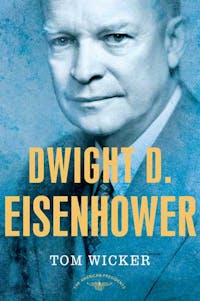Dwight D. Eisenhower
The American Presidents Series: The 34th President, 1953-1961
 Download image
Download image
ISBN10: 0805069070
ISBN13: 9780805069075
Hardcover
176 Pages
$35.00
CA$49.00
A New York Times Notable Book
A bona-fide American hero at the close of World War II, General Dwight D. Eisenhower rode an enormous wave of popularity into the Oval Office seven years later. We may view the Eisenhower years through a hazy lens of nostalgia, but the good times of the 1950s distracted the public from a world in the throes of great transition, and masked profound unease both at home and abroad. Americans didn't seem to mind much that their fatherly president spent much of his time on the golf course with his wealthy businessman cronies, or that his health was suspect.
Veteran journalist Tom Wicker traces Eisenhower's life from his hardscrabble Kansas childhood, through his West Point years and his dramatic success during the war to his reluctant entry into politics. Throughout, we see a good and determined man—at times, says Wicker, a great man—who is remembered as much for his personal magnetism as for his aura of competence and command. And yet his tenure as chief executive can best be described as one of missed opportunities. His middle-of-the-road politics maintained the status quo, but never rose to the level of visionary leadership that could have led the country forward through uncertain times. He neglected the growing weaknesses in the once-robust economy. He stood aloof from the two great moral issues of 1950s America—school desegregation and McCarthyism. And though he was revered for "keeping the peace" during the height of the Cold War, he fumbled a golden opportunity to sign a comprehensive nuclear test-ban treaty with the Soviet Union. In Wicker's words, "the worst did not happen in his time, but neither did the best. When he left office, the world was as divided and hostile, in some ways more so, than when he was elected."
Reviews
Praise for Dwight D. Eisenhower
"The most popular president of modern times, often referred to as a 'father figure' for the nation, the conqueror of Hitler in World War II, and later the first commander of NATO forces, Eisenhower was the most experienced and may have been the most revered American ever to assume the presidency. And for eight years as expected, he maintained an uneasy peace, ending the war in Korea, avoiding others, and presiding magisterially over the home front.Yet, he could not end the Cold War with the Soviet Union. He did not lead in his country's great moral struggle for equality of the races. His weapon against the evils of McCarthyism usually was silence. Eisenhower left office in 1961, still an iconic figure in the world—but as a president who had more nearly kept the status quo than achieved the world peace of which he dreamed and had had little effect on an evolving American democracy."—Tom Wicker on Dwight D. Eisenhower
"Diligently presented . . . [Wicker] finds it easier to like the man than his policies. Eisenhower, he concedes, was charming and commanding, perhaps a better president than the estimable Democratic leader Adlai Stevenson would have been, but he was inept and insensitive in dealing with the two major issues of his time, the cold war and civil rights."—Alonzo L. Hamby, Ohio University, The New York Times Book Review
"Another in the American Presidents series edited by Arthur Schlesinger Jr., this brief review of the presidency of Dwight D. Eisenhower by one of the nation's most respected journalists is a valuable addition to the literature of the administration and its times. While necessarily cursory owing to the page limitations by the series, this work nonetheless captures the key events of the Eisenhower presidency in a way that is highly accessible and intellectually compelling . . . This is one of the finest single-volume treatments of the Eisenhower presidency available."—Michael A. Genovese, Loyola Marymount University, Library Journal
"Well-written . . . A brief but solid study that gives credit where it's due . . . [Eisenhower] conducted his presidency with moderation and diplomacy, welcome in a time of ever-heating cold war; among other things, he ended the war in Korea and steered a peaceful course through the shoals of events such as the U2 incident and the French defeat in Indochina. Yet, Wicker holds, Eisenhower had at least as many failures as successes: he failed to de-fang the red-baiting Senator Joseph McCarthy, preferring to avoid confrontation with him; he allowed Richard Nixon the job of vice president, even though Eisenhower seems to have detested him . . . and he did almost nothing, and then reluctantly, to attend to pressing issues on the home front, particularly those having to do with civil rights."—Kirkus Reviews
"[Wicker] offers a solid account, plus a unique personal view . . . A fine introduction to 1950s political history, the biography covers the domestic and international crises that occurred on Eisenhower's watch, including the Supreme Court's decision to racially integrate public schools, the poisonous influence of Sen. Joe McCarthy, tensions with the Soviet Union and the threat of nuclear war."—Publishers Weekly
Reviews from Goodreads
BOOK EXCERPTS
Read an Excerpt
Listen to an Excerpt from the Audiobook
Download MP3MEDIA
Watch
Dwight D. Eisenhower by Tom Wicker--Audiobook Excerpt
Listen to this audiobook excerpt from Tom Wicker's biography Dwight D. Eisenhower, part of The American Presidents Series. A bona-fide American hero at the close of World War II, General Dwight Eisenhower rode an enormous wave of popularity into the Oval Office seven years later. Though we may view the Eisenhower years through a hazy lens of 1950s nostalgia, historians consider his presidency one of the least successful.
Share This


